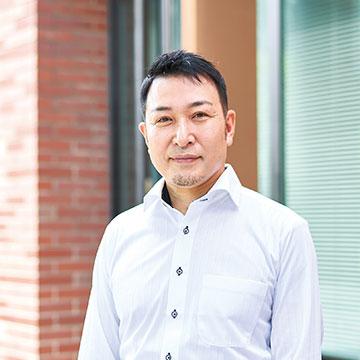TSUKUBA FRONTIER
#038 Psychology to Promote Changes in Deviant Behavior: Approaches to the Workings of the Mind that Go Beyond Punishment and Persuasion
Professor HARADA Takayuki, Faculty of Human Sciences

You want to stop, but you can't... Everyone experiences times like this.
Crime and addiction can be seen as an escalated form of such compulsions.
It may start out as a passing fancy or curiosity, but once a behavior is perceived as pleasurable, it is repeated even when the person knows it is wrong. While such behaviors are a kind of disorder and are treatable, the fact remains that they are surrounded by widespread misinformation and prejudice. Professor Harada works at the forefront of psychotherapy, disseminating correct knowledge to scientifically deal with repeated deviant behavior.
Behavior is changeable

When behavior that deviates from social norms, such as crime, needs to be changed, what methods are effective? We can try to persuade the individual concerned to change their ways, explain the situation in an orderly manner, or impose some kind of penalty. However, people cannot change so easily. Even if a person understands the situation in their head, their feelings of stress and anxiety may be greater, or they may be overwhelmed by desire or pleasure. This is when psychology comes into its own.
To stop such deviant behavior, it is not enough to impose punishment or to make the individual reflect on their behavior. In particular, drug addiction and sex crimes are likely to be repeated, even after the person has served their sentence and returned to society. On the other hand, many of these people have a desire to get back on their feet.
Since it is cognitive and behavioral distortions that cause these deviant behaviors, it is possible to correct, or treat, them. In fact, data shows that intensive psychotherapy treatment programs can reduce recidivism rates by nearly 30%. Of course, it goes without saying that it is also important to create an infrastructure of places and opportunities to provide such treatment, and to link these to a long-term support system to prevent isolation after treatment.
Understanding psychology through the use of epidemiologic methods
Data is important in exploring the causes of such deviant behavior and related factors. Epidemiological studies have been undertaken in some parts of the world that follow children born in a certain region for decades, analyzing various factors from a medical and mental health perspective. Even with projects that are not quite as extensive as these, there is a trend in the field of psychology to try to incorporate such research methods.
Prof. Harada's current project is a survey of sex offenders. There are a variety of risk factors for sexual offending, but the one he is focusing on is a cognitive tendency called delay discounting. When we look at things like choosing between small pleasures that are right in front of us or larger pleasures that we can get later, we have seen that offenders tend to jump to the pleasure that is right in front of them more easily than those who do not, that is, they discount the (delayed) effects on their families and lives that will come later. With the help of hospitals and self-help groups, more data could be collected and further detailed analysis could suggest interventions to help control such impulsivity and behavior. If we were also to include analysis of other factors that can lead to sexual offending, such as thought patterns and cognitive distortions, we should be able to find more effective treatment programs.
Workings of the mind and brain
Psychological theories of deviant behavior, both classic and new, are relatively well presented to the general public, but they cannot be the only way to describe psychology. More recently, biological approaches have also received increasing attention. The study of genes and brain mechanisms in relation to crime has long been taboo, as it could promote eugenic thinking. However, the mind is, in essence, a function of the brain. Without knowing the correct cause, it is impossible to respond appropriately. For this reason, research using brain imaging and genetic analysis has been advancing.
The reason we are unable to stop deviant behavior is because we get pleasure from it. The memory of it builds up and the brain circuits that feel pleasure become hypersensitive. Crimes such as molestation and theft, and addictions to alcohol and drugs all involve the same mechanism. However, there are no drugs that can quell such brain functions. Even if there were such drugs, the nervous system that is aroused by pleasure would be the same, and so the various other pleasures of daily life would be lost as well. Then the joy of living itself would be lost. So for now, we can only hope for psychotherapy to cure these deviant behaviors.
The diversity of human beings in prisons
At first glance, criminal psychology may seem like a daunting field, but when Prof. Harada actually interviewed a variety of offenders in prisons and detention centers when he was a student, he found many people with rare disorders that he had only read about in textbooks and many people with behavior patterns that were unthinkable to common sense. This experience drastically opened up his sense of values about human beings, leading to a heightened interest in humanity.
The human mind has not only a bright side, such as love and dreams, but also a dark side, such as envy and hatred. Crime can be seen as one of the manifestations of this dark side, which usually remains hidden. Looking at these parts of a person without preconceived notions that he or she is a criminal will lead to a deeper understanding of the human condition.
Spreading correct psychology for the benefit of society
When a serious crime with a large social impact occurs, the media and purported experts try to explain the motives and actions of the perpetrators by linking them to their unfortunate upbringing or peculiar personalities. However, such crimes do not occur often, and there is not enough data collected to provide evidence. A true expert should not be able to give easy answers.
Certainly, people tend to look for such easy-to-understand explanations. However, it is undesirable for society and academia if wrong information and prejudice spread as psychological knowledge. Academic societies have come to promote the active dissemination of information in light of this situation. Against this background, Prof. Harada has written not only academic papers and books, but also many paperback books and articles for online media aimed at the general public, and is making efforts to speak out energetically in the media and on social networking services.
It is important for researchers working in the field of criminal psychology to return their findings to society. To this end, Prof. Harada also values various forms of communication with society, such as introducing treatment programs in prisons, working on initiatives for the issue of sexual crimes by school teachers, and collaborating with judicial and political officials to address these issues. In this way, his greatest joy is to be involved in research on clinical treatment and to see people who have once made mistakes recover.
Profile

Born in Tokushima Prefecture in 1964. Graduated from the Faculty of Social Sciences and the Graduate School of Social Sciences, Hitotsubashi University. MA in Psychology, California State University, Los Angeles. PhD in Health Sciences, Graduate School of Medicine, University of Tokyo. He served as a legal specialist at the Correction Bureau, Ministry of Justice, as an associate expert at the United Nations Office on Drugs and Crime, Vienna, and as a professor in the Faculty of Human Sciences, Mejiro University, before assuming his current position. He specializes in clinical psychology, criminal psychology, and mental health.
(URL: https://www.human.tsukuba.ac.jp/counseling/english/)
Article by Science Communicator at the Bureau of Public Relations


